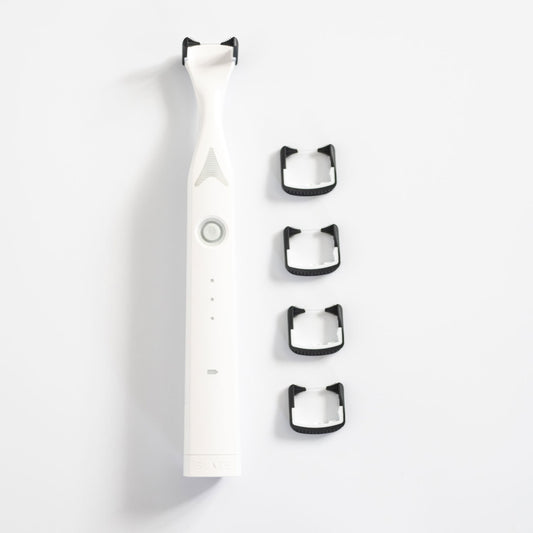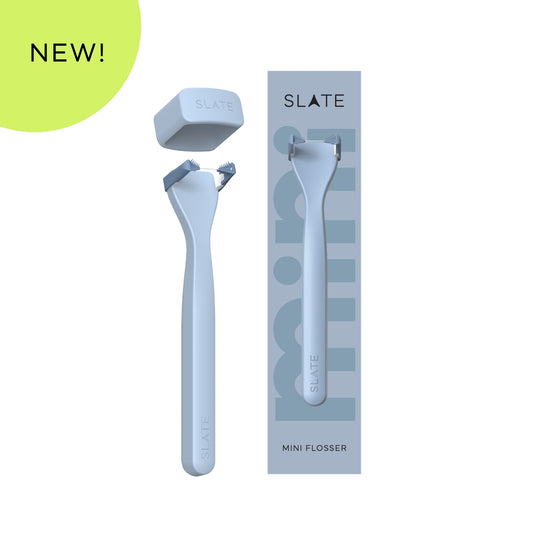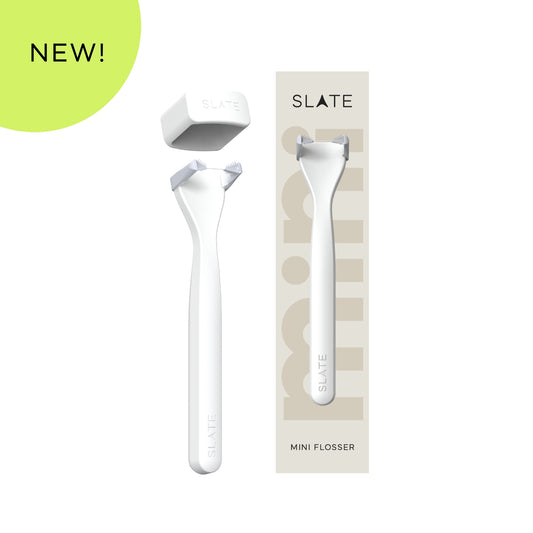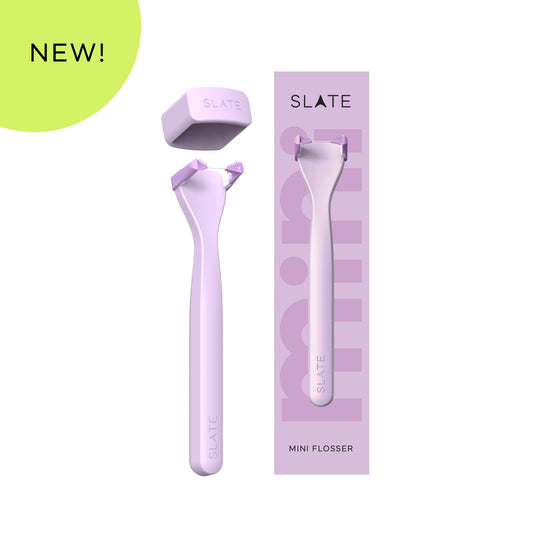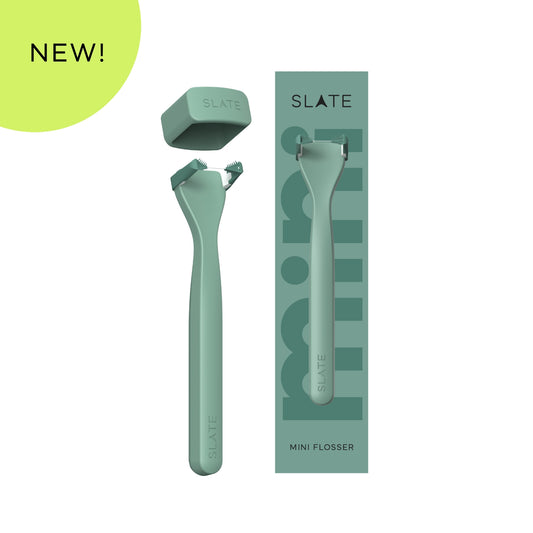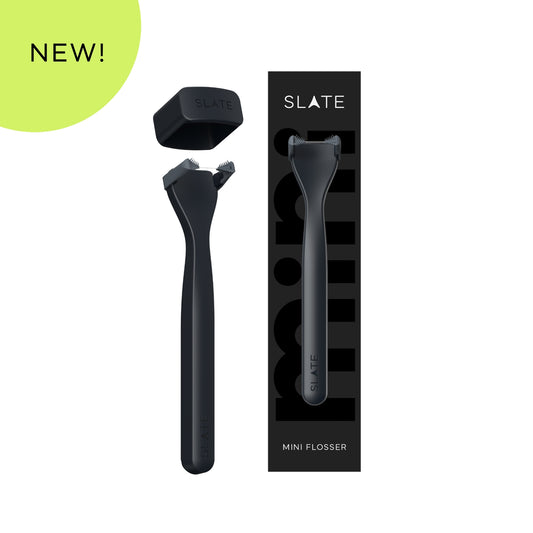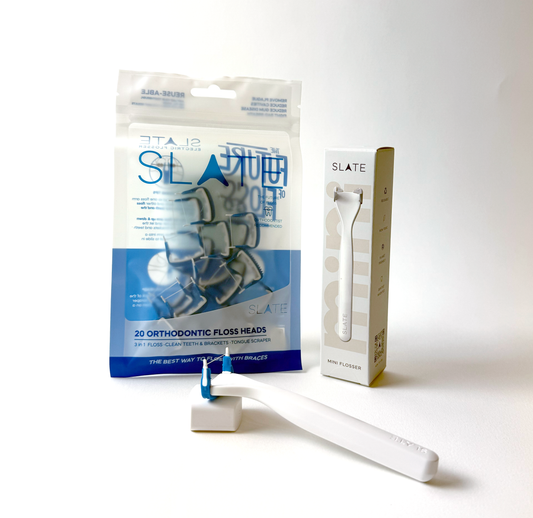
If you’ve consistently struggled to floss, then you may not have given much thought to when you floss, only whether you do it at all. We all know flossing is essential for healthy teeth and gums, but the timing can feel unclear. Should you floss in the morning to start your day fresh? Or is nighttime flossing better, clearing out debris before you head to bed?
Let’s break it down so you can build a daily flossing routine that fits your life and supports your smile.
[Get Your Slate Electric Flosser Today]
Why the Timing of Flossing Matters
The purpose of flossing is simple: it removes food particles, plaque, and bacteria from between your teeth and along the gumline. Flossing is the most effective way to access the spots your toothbrush just can’t reach. It doesn’t matter if you set a two-minute timer and brush thoroughly; there are some spots that are just too difficult for your toothbrush to get to. If you don’t floss, you’re likely to experience:
-
Bad breath
-
Gum disease
-
Cavities and tooth decay
-
Long-term oral health issues
So, is morning or nighttime flossing best? The answer depends on your habits, but both have unique benefits.
Flossing in the Morning: Pros & Cons
✅ Pros
-
Removes buildup from overnight bacterial growth
-
Leaves your mouth feeling fresh and clean to start the day
-
Combats morning breath when paired with brushing and tongue scraping
⚠️ Cons
-
Easy to skip if mornings are busy
-
Doesn’t protect against food and plaque buildup during the day
👉 Best for: People who want to feel extra fresh at the start of the day, or those who snack minimally.
Flossing at Night: Pros & Cons
✅ Pros
-
Removes food and plaque from the day
-
Protects your teeth when saliva production slows at night
-
Reduces risk of overnight plaque buildup
⚠️ Cons
-
Easier to skip if you’re tired
-
Evening routines can feel rushed
👉 Best for: People who snack often or sip drinks throughout the day, or anyone who wants maximum overnight protection.
Morning vs. Night: Which Is Better?
If you only floss once a day, nighttime flossing is best. It ensures your teeth are clean before hours of sleep, when bacteria thrive most.
That said, flossing twice a day, both morning and night, provides the greatest benefits. This is especially helpful if you:
-
Have gum sensitivity or bleeding
-
Struggle with bad breath
-
Have tight spacing between teeth that traps food easily
Tips to Build a Daily Flossing Routine
Flossing regularly is more about consistency than timing. Try these easy tricks to make it stick:
-
Pair it with another habit: Floss after brushing or while waiting for your coffee.
-
Keep it visible: Store floss by your toothbrush so you don’t forget.
-
Use the right tool: If traditional floss is tough, try floss picks or upgrade to an electric flosser.
-
Set reminders: Use an alarm or sticky note on the mirror.
-
Be consistent, not perfect: If you miss a day, just start again the next.
Make Flossing Easier with the Slate Electric Flosser
No matter when you floss, how you floss matters just as much. The Slate Electric Flosser was designed to make flossing easier, more effective, and more enjoyable with features like:
-
Patent-Pending Gum Sweeps that gently remove plaque while stimulating healthy blood flow.
-
Chemical-Free, Woven Floss that is free of wax, PFAS, and PTFE
-
Multi-Use Floss Heads that last up to a week
-
Smart Sonic Vibration Memory so your flosser remembers your preferred setting
-
Built-In Tongue Scraper to support fresher breath, morning or night
Whether you’re a morning flosser, nighttime warrior, or ready to commit to both, Slate is the perfect companion.

The Bottom Line
The best time to floss is the time you’ll actually do it. If you only floss once, choose nighttime for maximum protection. But if you want the healthiest gums and freshest breath, floss twice a day.
No matter when you do it, the most important thing is to floss every single day. A healthy smile is built or destroyed day by day. So, do everything you can to have more good days than bad ones.
[Find Your Perfect Flossing Routine with Slate]
